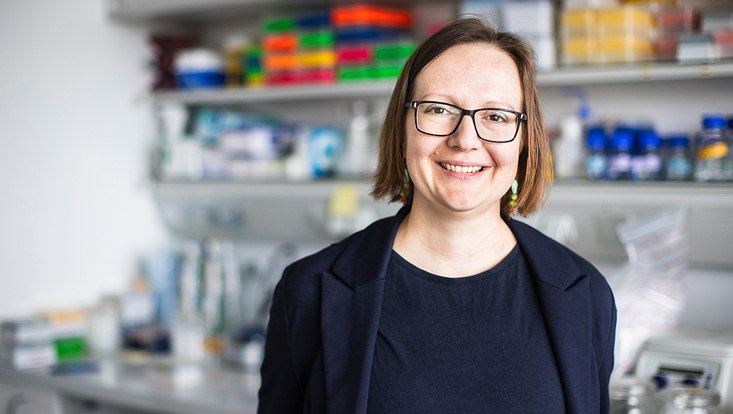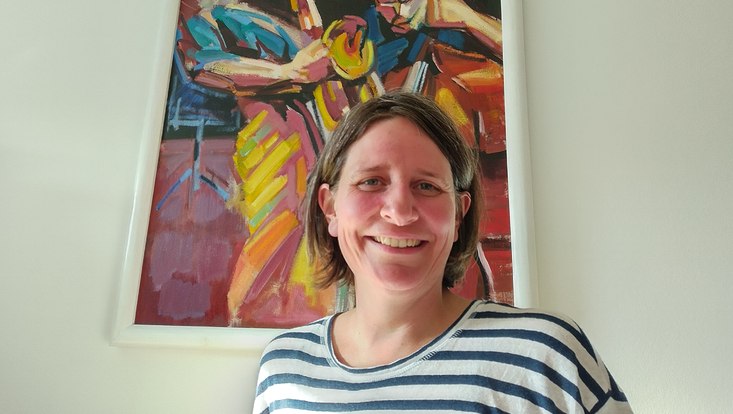Welcome aboard!“What pedagogical possibilities are there in the face of an uncertain future?”Prof. Dr. Kerstin Jergus strengthens the Faculty of Education.
1 November 2023, by UHH/Gießelmann

Photo: Private
Every year, Universität Hamburg welcomes numerous new researchers. This series introduces them and their areas of research. This time: Educator Prof. Dr. Kerstin Jergus
Prof. Dr. Kerstin Jergus joined the Faculty of Education as a professor of general educational science in Winter Semester 2023/24 after her tenure at the Technische Universität Braunschweig.
My research area in brief:
First and foremost, I have focused for a long time, and each time with renewed enthusiasm, on the theory and history of pedagogy. For example, I work on questions of pedagogical authority, educational theory, and pedagogical relationships throughout history and in the present. In this context, I am interested above all n how social transformations and sociopolitical contexts give rise to and make possible different educational relationships.
At the moment, for example, we could point to climate change, which raised the immediate question as to how we can even enable future generations to organize their world. And here, too, educational policy and sociocultural dimensions play a role, for example, with a view to the relationship between democracy or normalization and/or identity challenges in the development of self.
Both of these areas of focus—theory and history in connection with sociopolitical contexts—interest me second, also from a research perspective. For example, what does it mean to be a pedagogical expert in a field that educational policy has reevaluated, as I looked at in my research on the continuing education of early childhood educators together with my Frankfurt colleague Christiane Thompson? Or what does it mean for young people to grown up in times of political and social transformation and to become educated in this context? A question I am working on currently as part of my research on future youth policy.
This is how I explain my research to my family:
I work on pedagogical topics based on the question how the world we inhabit (and who, actually, is this “we”?) can make it possible for future generations to live (independent) and self-determined lives. At the moment, these questions are arising in the face of climate change and against the backdrop of antidemocratic tendencies in society.
I mainly use these methods:
I do theoretical, ethnographic, and discursive and analytical research, that means my method are always based on the question of how orders and powerful structures are “made” and they open our eyes to the ways those involved can be empowered to act independently or in opposition.
My research is important for society because:
I have already mentioned the pedagogical possibilities in the face of an uncertain future in light of the Anthropocene and human-caused climate change, meaning I focus on a socially critical perspective on growing up in today’s society.
I see my contribution on the one hand with regard to the training of pedagogical experts within and outside the school who can take a stand on such questions based on theory, reflectively, and critically. On the other hand, I see my theoretical work and research as important contributions to current social questions that especially concern the education of children and adolescents and to thinking about power relationships and last but not least the question about possibilities for change that are subordinated to the current compulsion to optimize.
This is why students should come to my lectures:
In my academic teaching, I will look at the principles of and basic questions in pedagogy such that current challenges and the historical paths of pedagogical activities are accessible. This aspiration for theory-based and modern academic teaching will be supported by a shared understanding—academic work is not always easy but it is, above all, a joyful thing and I would like to impart that to my students.
These are my plans at Universität Hamburg:
Strengthening the relevance of theoretical education in the humanities, but especially in education, and making it visible, strongly drives my academic work. Making this clear to students and colleagues in scholarly discourse and in internal university understanding as well as discussing current pedagogical issues in the larger public is a goal I’d like to strengthen.
In Hamburg, the city and the University, I am looking forward to:
The breadth of the city—culturally, spatially, and academically.


